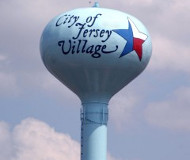2/26/2016
Texas: Camera Company Reveals Anti-Referendum StrategyCity council in Jersey Village, Texas deploys ballot countermeasure to save automated ticketing until 2024 and beyond.

After being defeated at the ballot box seven times in Texas, red light camera companies have come up with a new strategy to rescue their programs. Instead of going to court to block the vote in Jersey City, American Traffic Solutions (ATS) convinced the city council last week to place a second measure on the ballot that would undermine Proposition One, the charter amendment submitted by the Houston suburb's voters.
Last year, residents outraged by the automated ticketing system successfully circulated a petition calling for a referendum on photo enforcement during the May 2016 election. Proposition One, if adopted, would immediately prevent the city from collecting any camera revenue. To counter this, the city council added its own measure to the ballot, Proposition Two, which would amend the total ban on red light cameras to say that the city could continue automated ticketing until at least the year 2024 -- possibly longer with five year extensions.
"Barry Klein and his group did a great job going around the city getting citizens to sign the petition," petition co-sponsor Jim Pulliam told TheNewspaper. "We turned that petition in to the city, which really surprised the hell out of them, and of course they were able to work with ATS to come up with this Proposition Two. We knew something was going to happen, but we didn't know exactly what."
Jersey Village officials argue that an immediate ban would cost the city millions because ATS would demand a massive settlement payment if the program were shut down. The city is in this position because it overreacted to the legislature's 2009 attempt to sunset red light camera authorization statewide. The sunset bill failed, but many jurisdictions like Jersey Village rushed to evade the legislative intent by renewing contracts for fifteen years, or more.
Jersey Village's contract with ATS does contain an escape clause. As part of the 2009 amendment, ATS gave the city the right to terminate the agreement with sixty days' notice if "the collections for the program are less than the fixed monthly fee due to ATS for three consecutive months," which would happen if the camera ban took effect. ATS would keep all of the profit after receiving the termination notice as payment for the costs of winding the program down. The original initiative sponsors are confident that voters will not buy into the city's monetary argument, and they will go door-to-door to ensure that residents are not confused by the dueling propositions.
"We're planning to tell them that they need to vote for Proposition One and against Proposition Two," Pulliam said.
More individuals have already signed the anti-camera petition than typically vote in a Jersey Village election. The sentiment is common in Texas, where residents have voted to oust red light cameras in Conroe, Dayton, Houston, Baytown, League City, Arlington and College Station by margins of as much as 77 percent against. Nationwide, voters overwhelming oppose the use of cameras at the ballot box (view list).
Article Excerpt:SHALL THE JERSEY VILLAGE CHARTER BE AMENDED BY ADDING A NEW SECTION 1.09, LIMITATIONS ON POWER OF COUNCIL, TO PERMIT THE CITY TO COMPLETE RED LIGHT CAMERA TRAFFIC PROGRAMS STARTED BEFORE JANUARY 1, 2016?
In the event of the approval of this proposition, Article I of the City Charter shall be amended by adding a new section 1.09 to read as follows:
ARTICLE I. INCORPORATION, FORM OF GOVERNMENT AND POWERS Section 1.09. – LIMITATIONS ON POWER OF COUNCIL
The limitations on the powers of the City Council in Section 1.08 related to photographic traffic signal systems shall not apply to any contract or contractual obligation incurred by or on behalf of the City on or before January 1, 2016.


